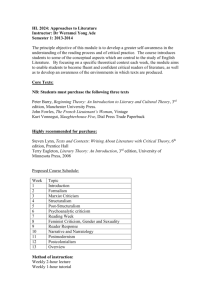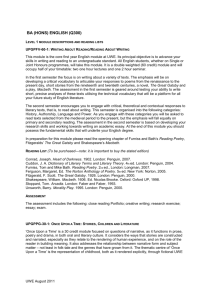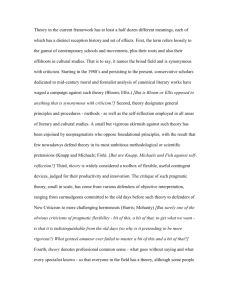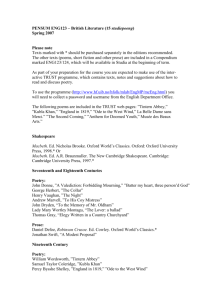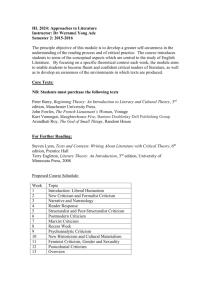MSt in English Literature, 1550-1780
advertisement
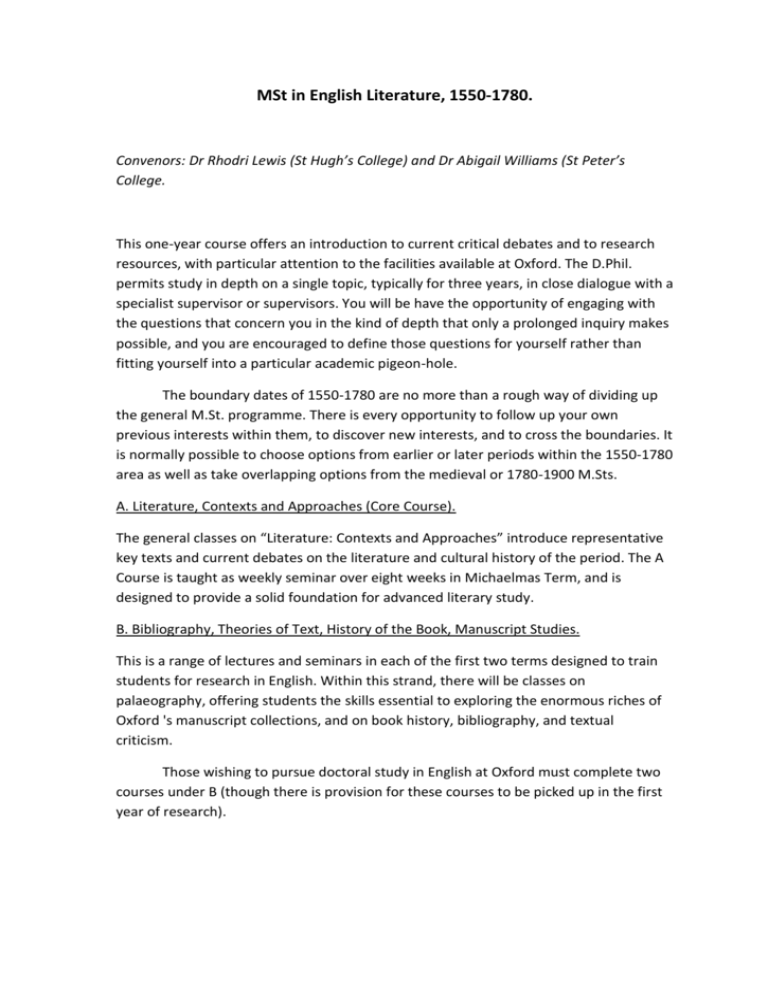
MSt in English Literature, 1550-1780. Convenors: Dr Rhodri Lewis (St Hugh’s College) and Dr Abigail Williams (St Peter’s College. This one-year course offers an introduction to current critical debates and to research resources, with particular attention to the facilities available at Oxford. The D.Phil. permits study in depth on a single topic, typically for three years, in close dialogue with a specialist supervisor or supervisors. You will be have the opportunity of engaging with the questions that concern you in the kind of depth that only a prolonged inquiry makes possible, and you are encouraged to define those questions for yourself rather than fitting yourself into a particular academic pigeon-hole. The boundary dates of 1550-1780 are no more than a rough way of dividing up the general M.St. programme. There is every opportunity to follow up your own previous interests within them, to discover new interests, and to cross the boundaries. It is normally possible to choose options from earlier or later periods within the 1550-1780 area as well as take overlapping options from the medieval or 1780-1900 M.Sts. A. Literature, Contexts and Approaches (Core Course). The general classes on “Literature: Contexts and Approaches” introduce representative key texts and current debates on the literature and cultural history of the period. The A Course is taught as weekly seminar over eight weeks in Michaelmas Term, and is designed to provide a solid foundation for advanced literary study. B. Bibliography, Theories of Text, History of the Book, Manuscript Studies. This is a range of lectures and seminars in each of the first two terms designed to train students for research in English. Within this strand, there will be classes on palaeography, offering students the skills essential to exploring the enormous riches of Oxford 's manuscript collections, and on book history, bibliography, and textual criticism. Those wishing to pursue doctoral study in English at Oxford must complete two courses under B (though there is provision for these courses to be picked up in the first year of research). C. Special Options. Special Option courses are one-term courses on specialist themes usually relating to the current research interests of the teacher(s). Students normally take one Special Option in each of the first two terms, but may take up to four if they decide to opt out of the B course. The special option courses present an excellent opportunity for you to develop your research interests. You are not constrained to follow option courses within your designated period, and indeed, option courses often traverse the boundaries of the broad periods. D. Dissertation. All students write a 10,000 word dissertation on a subject of their choice, but related to the work they have been doing over the year. You will be assigned to a member of Faculty who will act as your supervisor. Assessment. In addition to the dissertation, you will submit three essays of 5-7,000 words – one at the end of the first term, and two at the end of the second term – relating to the B and C courses that you have taken. Students normally take all four components to fulfil the requirements of the degree. All course work will be completed by the end of the second term (Hilary Term), leaving the summer term (Trinity Term) for the writing of the dissertation, which is submitted in early June. The schedule of A, B and C courses for the academic year 2009-10 is as follows: Michaelmas Term: A-Course David Norbrook and David Womersley, “Literature: Contexts and Approaches, 1550-1780” B-Courses Kathryn Sutherland, “Material Texts (1550-1830)” William Poole, “Early Modern Hands” C-Courses John Pitcher, “The Sidneys” Rhodri Lewis, “Early Modern Writing and the New Philosophy” Paulina Kewes, “Shakespeare, History and Politics” Christine Gerrard and Giles Bergel, “Grub Street” Hilary Term: B-Course Rhodri Lewis and Giles Bergel, “Reading, Writing and Editing Early Modern Texts” C-Courses Laurie Maguire and Emma Smith, “Problems in/of Shakespeare Studies” Sharon Achinstein, “The New Milton Studies” Peter McCullough, “The Sermon and Early Modern Literary Culture” Freya Johnston, “English Biography, 1683-1791” Trinity Term: D-Course Work with individual supervisors on Dissertation M.St. in English Literature, 1550-1780 A – Literature: Contexts and Approaches, 1550-1780 David Norbrook (Merton) and David Womersley (St. Catherine’s) This course examines literary criticism and scholarship in the fields of early modern and eighteenth-century studies. We will consider arguments and assertions about, and images of, literature, both as they were rehearsed from the mid-sixteenth century to the late eighteenth century, and as they have been described, summarized and reconceived in critical studies of more recent years. We hope to stimulate your research by enquiring into the status and reach of English literature across the whole period 1550-1780. Try to read as widely as possible in the primary and secondary texts in advance of the class. Editions of primary texts specified are usually suggestions only, and in most cases many are available. The class meets on Monday, 10.00 am-12 noon, in the Breakfast Room, Merton College. Week 1: Studying the Early Modern at Oxford Studying the literature of the early modern period and ‘long eighteenth century’ in Oxford has the exceptional character that many of the research resources are themselves part of the cultural milieu of the literature. In this first session, based in Merton College, we shall explore ways in which the libraries and the architecture of Oxford embody the complex and uneven reception of the humanist ideas which informed much early modern literature. We shall look at some rare books from Merton College Library and discuss ways in which the Bodleian Library could be said to embody the humanist ideals of a figure like Sir Philip Sidney. We shall also discuss the rather slow and indirect ways in which what we would now regard as canonical English literature came into academic libraries. M. R. A. Bullard, ‘Talking Heads: The Bodleian Frieze, its Inspiration, Sources, Designer and Significance’, Bodleian Library Record, xix/6 (April 1994), 461500. Geoffrey Tyack, Oxford: An Architectural Guide (Oxford, 1998). ‘Research Resources’ and ‘Resources in Oxford’ sections of the Centre for Early Modern Studies website (www.cems.ox.ac.uk). Week 2: Theories of Literature (1) Current criticism is showing some reaction against a long-standing bias towards historicizing approaches, arguing that we have lost sight of what makes literature distinctive and worth studying. We shall ask what reading practices the humanist curriculum encouraged and what space it allowed for something we might describe as literary. Roger Ascham, ‘On Imitation’, in The Scolemaster (1570), in Brian Vickers (ed.), English Renaissance Literary Criticism (OUP, 2003), pp. 140-61. Philip Sidney, The Defence of Poetry (c. 1580; printed 1595), ibid., pp. 336-91. Ben Jonson, ‘Epistle Dedicatory’, Volpone, or, The Fox, quarto ed. (1607), ibid., pp. 470-3. Mark Robson, ‘Defending Poetry, or, Is there an early modern aesthetic?’, in The New Aestheticism, ed. John J. Joughin and Simon Malpas (Manchester UP, 2003), pp. 119-30. Week 3: Theories of Literature (2) After the Restoration, discussions of literature were taken forward in relation to new problems and exigencies. The relation between modern writing and the classical tradition was freshly examined, and modernity’s claims to emancipation from the burden of classical precedent were both asserted and denied. Moreover, rivalries between European nations in politics and warfare, as well as antagonisms within particular nations, found an echo in literary discussion. We will sample and explore these new critical agendas. John Dryden, Of Dramatick Poesie, An Essay (1668), in David Womersley, ed., Augustan Critical Writing (Penguin, 1997). Alexander Pope, An Essay on Criticism (1711), in Augustan Critical Writing. Samuel Johnson, Preface to Shakespeare (1765), in Johnson on Shakespeare, ed. Arthur Sherbo (Yale, 1968). or Dr Johnson on Shakespeare, ed. W. K. Wimsatt (Penguin, 1969). David Womersley, ed., Augustan Critical Writing (Penguin, 1997), ‘Introduction’. Week 4: Self and Subjectivity With Renaissance Self-Fashioning, Stephen Greenblatt took a revisionist view of older narratives of the birth of Renaissance individualism, drawing on more recent theoretical analyses of the social construction, or the deconstruction, of the gendered subject. This week, students will review the stakes and consequences of this critical turn. Stephen Greenblatt, Renaissance Self-Fashioning: From More to Shakespeare (revised edition, Chicago UP, 2005), especially Preface, Introduction, ch. 1, Epilogue. Thomas More, Utopia. Week 5: Virtù to Virtue Complementing critical emphasis on the individual has been a large body of scholarship exploring the importance of dialogue and collective action in early modern social and political thought. Some historians and literary critics perceive a shift in the middle of our period from conceiving of virtue in terms of ‘public’ values (military, courtly, educational) to ‘private’ values (benevolence, sympathy) more suited to a ‘trading’ nation, with attendant shifts in the status of a ‘public sphere’. We will test this narrative. Lorna Hutson, The Usurer’s Daughter: Male Friendship and Fictions of Women in Sixteenth-Century England (Routledge, 1994). J.G.A.Pocock, Virtue, Commerce, and History: Essays on Political Thought and History, chiefly in the Eighteenth Century (CUP, 1985), Chapter 2. William Shakespeare, The Merchant of Venice. Bernard Mandeville, The Fable of the Bees: Or, Private Vices, Publick Benefits (1714-32), ed. Phillip Harth (Penguin, 1989); or use the Kaye edition, republished cheaply by Liberty Fund. Week 6: Gender and Writing Over the last quarter-century many long-forgotten writings by early modern women have been recovered to the canon. Once seen as lost or silenced voices, women are now often seen as significant partners in the writing community. What, then, is gained by studying them as a separate group? And does writing by men share a distinct gendered identity? Does modern gender criticism impose anachronistic categories on different structures of patronage and friendship? We shall juxtapose some poems on similar themes by male and female poets, and look at some of the critical debates they have raised. Aemilia Lanyer, ‘The Description of Cooke-ham’. Ben Jonson, ‘To Penshurst’. Katherine Philips, ‘Friendship’s Mystery, To my dearest Lucasia’ and ‘To my Excellent Lucasia, on our Friendship’; all in David Norbrook and Henry Woudhuysen, The Penguin Book of Renaissance Verse (revised edn., Penguin, 2005). Margaret J. M. Ezell, Writing Women’s Literary History (Johns Hopkins University Press, 1989). Jonathan Goldberg, ‘The Legend of Good Women’, in Desiring Women Writing: English Renaissance Examples (Stanford UP, 1995), pp. 3-42. Week 7: Religion and Irreligion Seen in some new historicist criticism mainly as an instrument of social control, religion is receiving new attention as a complex cultural phenomenon and a major impulse behind some of the period’s greatest writing. We shall ask just what ‘religion’ did mean for the period, and how far it can be mapped on to particular denominational forms. Johne Donne, ‘Satyre III’ (‘Kinde pitty chokes my spleene’), in The Poems of John Donne, vol. 1, ed. Robin Robbins (Longman, 2008). John Dryden, Religio Laici, in Selected Poems, ed. Paul Hammond and David Hopkins (Longman, 2007). Jonathan Swift, Argument Against Abolishing Christianity (1711), in the Davis edition of the Prose Works, vol. II, pp. 26-39. David Hume, ‘Of Miracles’, Enquiry Concerning Human Understanding (1748), in the OUP edition by L. A. Selby-Bigge and P. H. Nidditch, pp. 109-31. Richard Strier, ‘Radical Donne: “Satire III” ’, ELH, 60:2 (1993), pp. 283-322, reprinted in Resistant Structures: Particularity, Radicalism, and Renaissance Texts (University of California Press, 1995). Brian Cummings, The Literary Culture of the Reformation: Grammar and Grace (OUP, 2007), pp. 366-78 Phillip Harth, Contexts of Dryden's Thought (Chicago UP, 1968). Week 8: Patrons and Markets Writing for money remained for much of our period subject to a sense of social unrespectability and patronage from the court or other figures might offer an attractive alternative. We shall investigate changes in this situation through our period and the ways in which they mark literary texts. Ben Jonson, Bartholomew Fair, Induction and act V. Jonathan Swift, The Battle of the Books (1704), in Angus Ross and David Woolley, eds., A Tale of a Tub and Other Works (OUP, 1986), or Davis, Prose Works, vol. I, pp. 137-65. Richard Savage, An Author to be Lett (1729), ed. James Sutherland, Augustan Reprint Soc. Publication 84 (William Andrews Clark Memorial Library, University of California, 1960); or available on ECCO. Henry Fielding, The History of Tom Jones, A Foundling (1749), ed. Martin Battestin and Fredson Bowers (Wesleyan University Press, 1975), Book I, ch. 1; or any paperback edition. Samuel Johnson, letter to Lord Chesterfield, 7 February 1755 (reprinted in Boswell’s Life of Johnson; or in Redford’s edition of Johnson’s Letters, vol. I, pp. 94-97). Leah S. Marcus, ‘Of Mire and Authorship’, in The Theatrical City: Culture, Theatre, and Politics in London, 1576-1649, ed. David L. Smith, Richard Strier, and David Bevington (Cambridge, 2003), pp. 170-81. Brean Hammond, The Rise of Professional Imaginative Writing in England, 1670-1740: Hackney for Bread (OUP, 1997), pp. 19-79. Alvin Kernan, Printing Technology, Letters & Samuel Johnson (Princeton, 1987), pp. 3-90.



